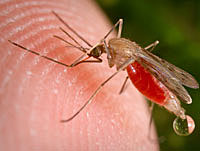-
(单词翻译:双击或拖选)
By Stephanie Ho
Washington
19 April 2007
Malaria1 kills more than one million people each year, with nearly all of those deaths children in Africa. As the continent marks Africa Malaria Day, on April 25, new treatments have been developed that could help the international community move closer to reducing deaths by 50 percent in three years.
 |
| Malaria is spread by mosquitoes |
The grotesquely4 made-up actors tell ridiculous stories of body aches and diarrhea. But the real message is that these ailments5 are very serious and are possible symptoms of malaria, a treatable disease that often kills.
Malaria is one of the most common infectious diseases and an enormous public-health problem in Africa. The disease is caused by malaria parasites6 that are transmitted by female Anopheles mosquitoes.
Awa Marie Coll-Seck is the executive director of the Roll Back Malaria Partnership7, which was founded in 1998 by the World Health Organization, the World Bank, UNICEF and the U.N. Development Program. Coll-Seck says it is hard to overestimate8 the devastation9 malaria causes in Africa.
"If you look at the structure in Africa, 30 to 40 percent of people who are coming to [medical] consultation10 are coming because of malaria," she said. "At the same time, that is the first cause of death of children under five."
She adds that of the one million-plus deaths from malaria each year, the international community has set a goal of cutting that number in half within three years.
One of the new tools in the anti-malaria arsenal11 is a medication called ASAQ. It combines the plant extract artemisinin and the anti-malarial drug ACT into one tablet. It also has a simpler dosing regimen than other anti-malarial drugs.
The non-governmental organization Drugs for Neglected Diseases Initiative and the French drug company Sanofi-Aventis developed ASAQ. Company vice12 president Robert Sebbag says his firm will receive no monetary13 profit.
"No patent, no intellectual property, for this compound. We accepted that and we will follow, because the needs are very important ones," he said.
Not everyone is impressed with the new drug. Its makers14 say it costs $1 for a complete adult dosage. But Ronan Jeambou, a doctor at the Institut Pasteur in Dakar, Senegal says that is still too high for rural Africans, who make an average of $1 or $2 a day.
He says if a customer were to buy this drug in a pharmacy15, it could cost as much as $13.50.
Other efforts to combat malaria include research at Johns Hopkins University, in Baltimore, Maryland. Scientists are trying to genetically16 modify mosquitoes so that they are no longer carriers of malaria. Roll Back Malaria's Coll-Seck says scientists and health workers also hope to develop a vaccine17 to prevent malaria.
"We have a lot of teams working on that," she said. "Until now, what is clear is that we will need 10 years before having a vaccine."
In South Africa, musician Yvonne Chaka Chaka is lending her name to the fight against malaria. She recently established a foundation that scrutinizes18 how African governments use malaria funds.
World Bank President Paul Wolfowitz, speaking at a ceremony launching the foundation, compared the daily death toll19 from malaria to the 2001 terror attacks on the United States.
"If you think about it, that is 3,000 people a day, that is as many people who died in the World Trade Center, but day after day after day," he noted20. "And 90 percent of them are in Africa, and it is now a preventable disease."
In Africa, officials and health workers have also taken steps to fight malaria. This includes distributing bed nets treated with mosquito-killing insecticide and teaching families how to use them. Another strategy is spraying insecticide in homes.
Health workers believe the strategy is having an effect. Regina Wanjiru Nyaga, the head nurse at a clinic in Kenya's Kiorugari village, says the number of patients testing positive for malaria in recent years has come down.
"Nowadays, they are reducing. There are not as many as used to come with malaria," she said.
The international community, together with local health care workers like Nyaga, are working to eliminate a disease that has brought so much devastation to Africa.
 收听单词发音
收听单词发音
1
malaria

|
|
| n.疟疾 | |
参考例句: |
|
|
|
2
drawn

|
|
| v.拖,拉,拔出;adj.憔悴的,紧张的 | |
参考例句: |
|
|
|
3
skits

|
|
| n.讽刺文( skit的名词复数 );小喜剧;若干;一群 | |
参考例句: |
|
|
|
4
grotesquely

|
|
| adv. 奇异地,荒诞地 | |
参考例句: |
|
|
|
5
ailments

|
|
| 疾病(尤指慢性病),不适( ailment的名词复数 ) | |
参考例句: |
|
|
|
6
parasites

|
|
| 寄生物( parasite的名词复数 ); 靠他人为生的人; 诸虫 | |
参考例句: |
|
|
|
7
partnership

|
|
| n.合作关系,伙伴关系 | |
参考例句: |
|
|
|
8
overestimate

|
|
| v.估计过高,过高评价 | |
参考例句: |
|
|
|
9
devastation

|
|
| n.毁坏;荒废;极度震惊或悲伤 | |
参考例句: |
|
|
|
10
consultation

|
|
| n.咨询;商量;商议;会议 | |
参考例句: |
|
|
|
11
arsenal

|
|
| n.兵工厂,军械库 | |
参考例句: |
|
|
|
12
vice

|
|
| n.坏事;恶习;[pl.]台钳,老虎钳;adj.副的 | |
参考例句: |
|
|
|
13
monetary

|
|
| adj.货币的,钱的;通货的;金融的;财政的 | |
参考例句: |
|
|
|
14
makers

|
|
| n.制造者,制造商(maker的复数形式) | |
参考例句: |
|
|
|
15
pharmacy

|
|
| n.药房,药剂学,制药业,配药业,一批备用药品 | |
参考例句: |
|
|
|
16
genetically

|
|
| adv.遗传上 | |
参考例句: |
|
|
|
17
vaccine

|
|
| n.牛痘苗,疫苗;adj.牛痘的,疫苗的 | |
参考例句: |
|
|
|
18
scrutinizes

|
|
| v.仔细检查,详审( scrutinize的第三人称单数 ) | |
参考例句: |
|
|
|
19
toll

|
|
| n.过路(桥)费;损失,伤亡人数;v.敲(钟) | |
参考例句: |
|
|
|
20
noted

|
|
| adj.著名的,知名的 | |
参考例句: |
|
|
|















